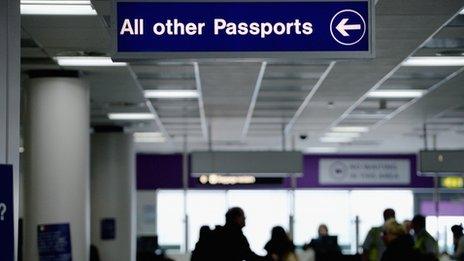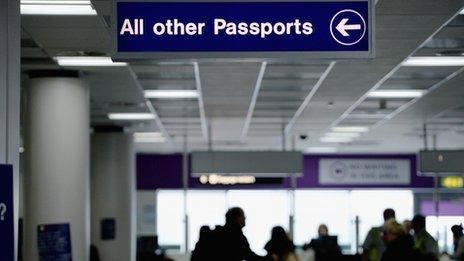Immigration debate over powers to deport foreign criminals
- Published
- comments

Government and rebel Tory MPs have clashed over powers to strip foreign-born criminals of citizenship
Home Secretary Theresa May has tabled an eleventh-hour amendment, external to her own Immigration Bill which is designed to strengthen powers to strip nationality from people suspected of involvement in terrorism.
It comes amid attempts by a cross-party group of backbenchers to make it easier to deport some foreign-born criminals. So what's the difference between the two proposals - and does it actually matter?
The background to all of this is the tension within the Conservative Party (and some parts of Labour) over the role of the European Convention of Human Rights - and the Strasbourg court that oversees it.
Article Eight of the convention, which is part of British law, says everyone has a right to a private and family life.
The state is perfectly entitled to ignore your right to a family life where there is an obvious public interest in doing so. If a judge says that you need to go to prison, that's where you will go - children or not.
But deportation of foreign nationals is more complicated where they can prove that they have a genuine connection to the UK because their children live here.
Critics such as Tory MP Dominic Raab say too many foreign criminals cling on to the UK by playing the children trump card, backed by the European Court of Human Rights.
So his proposal removes the legal requirement for the home secretary to take into account a foreign criminal's Article Eight rights before ordering them out of the UK.
It says ministers should only decide against deportation where the individual faces a threat of death, torture or - and this is the important part - it would cause "manifest and overwhelming harm to his children".
So in essence, Mr Raab's amendment aims to tip the public interest balance in the home secretary's favour when judges consider an Article Eight case.
However, there is a real question about whether it would actually work in practice because claimants could still try to mount an Article Eight appeal - and judges would be bound to look at related cases, including previous European judgements.
It's an extremely complicated area of law because there is so much at stake for both the state and the individual.
The home secretary's late amendment appears to be an attempt to meet some of the backbench concerns by offering to do more to deal with one part of this conundrum.
Her amendment does not specifically mention the word terrorism because it aims to strengthen her powers to strip nationality from people suspected, although not necessarily convicted, of very serious wrongdoing.

Home Secretary Theresa May's Immigration Bill is designed to strengthen powers to strip nationality from people suspected of involvement in terrorism
The home secretary can already remove nationality from a terrorism suspect. These cases go through one of the most secretive courts in Europe where very little is actually heard in public, including by the suspect themselves.
The most famous target of these powers was the cleric Abu Hamza - although he ultimately clung on to his British passport before he was extradited to the United States.
The proposed new power tries to get around the "Abu Hamza problem" and a recent similar Supreme Court ruling, external that went against the government.
The British Nationality Act 1981 says the home secretary cannot leave someone stateless.
Her proposal says that exception would not apply if she "is satisfied that the deprivation is conducive to the public good because the person... has conducted him or herself in a manner which is seriously prejudicial to the vital interests of the United Kingdom".
What are the "vital interests" of the United Kingdom? That may be for judges to consider if and when this ever becomes law - but it is a safe bet to assume that it does not cover a lot of low or medium-level criminality.
In other words, it looks like the new power could only be used in fairly exceptional cases - and only against someone who is a dual-national - those who can get a passport from another country - or people who sought citizenship after coming to live in the UK.
It would have no affect on British-born terrorists. They would still have to be dealt with at home.
- Published30 January 2014

- Published22 October 2013

- Published28 January 2014
